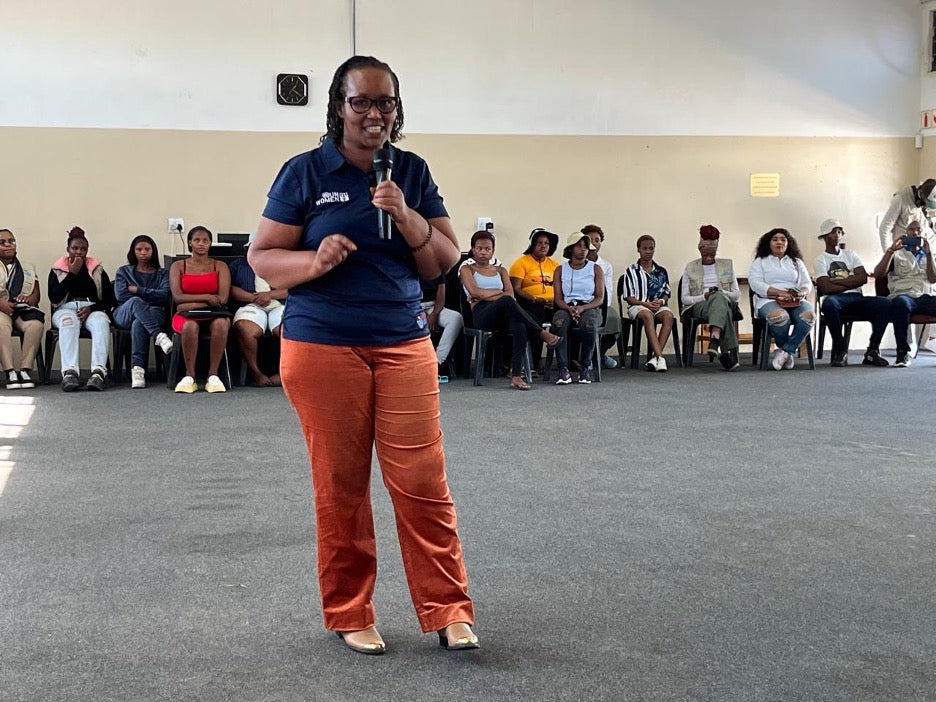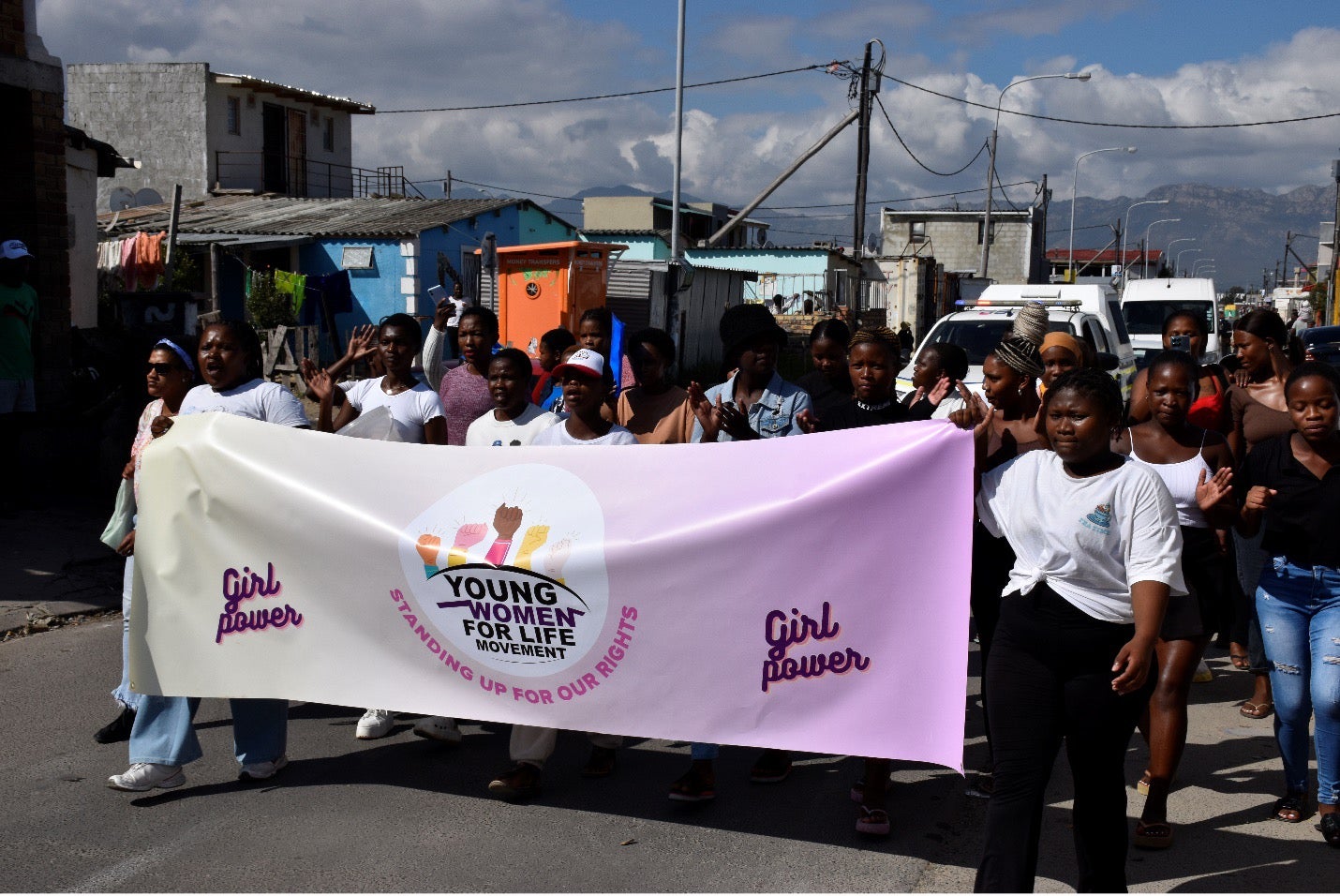‘Ensuring access to basic human rights reduces risky sexual behavior and consequently HIV infection’ - Q&A with Jacqueline Utamuriza-Nzisabira, HIV/AIDS Specialist for UN Women East and Southern Africa and manager of the Young Women for Life project
Date:

As we enter the Nomzamo Township in Cape Town, South Africa, we are greeted with the sounds of laughter, singing, and dancing. A group of young women eagerly awaits us, preparing for a group dialogue session. These participants, aged 15 to 25, are united by their desire for change and their belief in their own ability to drive it in their lives. This is the Young Women for Life (YWfL) movement.
Convened by the Southern Africa Catholic Bishops’ Conference and Peace Commission, and supported by the UN Women South Africa Multi-Country office (SAMCO) through the Unified Budget, Results and Accountability Framework (UBRAF), the YWfL movement was founded in 2019 to empower South African women and girls in the face of discrimination and hardship, structural drivers of vulnerability to HIV and gender-based violence (GBV). Together, members confront the challenges and threats they encounter in their day-to-day lives—including unemployment, HIV infection, and GBV.
We sat down to speak with the initiator of this project, Jacqueline Utamuriza-Nzisabira, Regional HIV/AIDS Specialist for UN Women East and Southern Africa and the manager of the YWfL project.
Q: How was the "Young Women for Life" project born?
Jacqueline: We had an initiative in the South Africa Multi-Country Office working with men and boys to transform harmful norms. As part of this initiative, we would organize a lot of community meetings. In one of these community meetings, there was a woman named Phumzile. She said, "I have girls in my neighborhood that are so idle and they are facing so many problems that I feel worried to see them walk around. I had invited them to come to my house to just talk about life because I went through difficulties that I would love them not to go through." I went with her to that community, and the idea for this project was born.
What started as a small circle of 80 girls in 2019 has become a movement of 8,000 girls in South Africa alone. Today, the project is in Eswatini, Lesotho, Botswana, and we’re also starting a chapter in Namibia. All we have done is somehow facilitate that they get space to meet. Everything else is about them. They have decided to take their lives into their own hands. In the different settings, they have started different initiatives. In the peri urban areas of Gauteng and Cape Town, they have enrolled in entrepreneurship courses offered by NOKIA (100 girls have taken the course so far), whereas in Cape Town, they started a hospitality course, and 70 of them have just graduated. In rural areas in Mpumalanga, Kwazulu Natal and Eswatini, girls have engaged extensively in farming and livestock activities.
These initiatives, spearheaded by UN Women through its implementing partner SACBC, were funded in large part by UNAIDS UBRAF within the context of the UN joint teams on AIDS, as catalytic funds to support UN Women in establishing proofs of concept in the thematic areas of addressing gender inequality and GBV within the HIV national response.
Q: Can you tell us about the intersection between HIV and gender equality?
Jacqueline: We realized that some of the biggest and most complex drivers of vulnerability to HIV and violence against women and girls are issues of inequalities, lack of access, and GBV, which are prevalent in this community and other similar communities. Issues like lack of access to basic human rights, such as justice and available services, are significant. This country has some of the best policies, but you'll be amazed how many kids in these vicinities can't even access a clinic due to certain structural barriers. This intervention bridged that gap and makes young women more resilient and reduces the risk of HIV infection and violence against women and girls.
We have seen that it is possible to reduce risky sexual behavior simply by fostering access. The initiative helped to curb harmful practices as well, such the phenomenon of "Blessers and Blessees," where young women have transactional and intergenerational relationships with older men, contributing to the growth of HIV infections in their population. But we saw that with our interventions, it is possible to end infections in young women and reduce violence against women and girls if we address the multiple structural issues young women face daily.
All the social issues we have documented that result from gender inequalities are very prevalent in this township. There’s high teenage pregnancy, high unemployment rates, multiple sexual risky behaviors, and issues of alcohol and drug abuse.

Q: What impact has the project had on the girls involved?
Jacqueline: We've seen girls assert themselves, takes their lives into their own hands, start enterprises and businesses. For instance, we have a brilliant star, Gugulethu, who seized the opportunity of being trained and not only created a bakery but now trains others in the programme. The support provided by the programme extends beyond psychological support, knowledge, and economic empowerment. In other townships, the YWfL movement is fighting to improve women and girls’ access to justice. This includes monitoring court cases surrounding GBV and advocating for improved services for the survivors involved in these cases. In 2021, members were involved in the resolution of 135 cases of rape and femicide—from the time they were reported to the police through to their conclusion in court. The movement supported young women and their families in navigating the criminal justice system and accessing counseling and psycho-social support services. As the saying goes, with the lemons these girls and young women have received from life, they have created lemonade and done amazing things. We are convinced that we are yet to see their full potential.
I want to turn to our young participants and say, "You are on the right path. Please, I know it's hard for as we go from celebrating here, tomorrow you face the same issues you have very bravely been facing. Don't give up. Your life is set on a positive course that is not going to change anymore. You are no longer on a path leading nowhere. You are on a path going someplace really good! I'm so proud of each one of you."
Q. What are the project’s plans moving forward?
The pilots in the different provinces and different countries have yielded positive results. The next step should be scale and expansion. To that effect, SAMCO has engaged the relevant government departments in South Africa, in Eswatini and Lesotho and plans to support them for scale and expansion. It is also the desire of SAMCO to document this model and promote it as a best practice in addressing structural drivers of vulnerability to HIV and GBV for Adolescent Girls and Young Women (AGYW)[GH1] in the national response.
[GH1]Suggest: adolescent girls and young women (take out acronym unless there is a clear reason to use it).